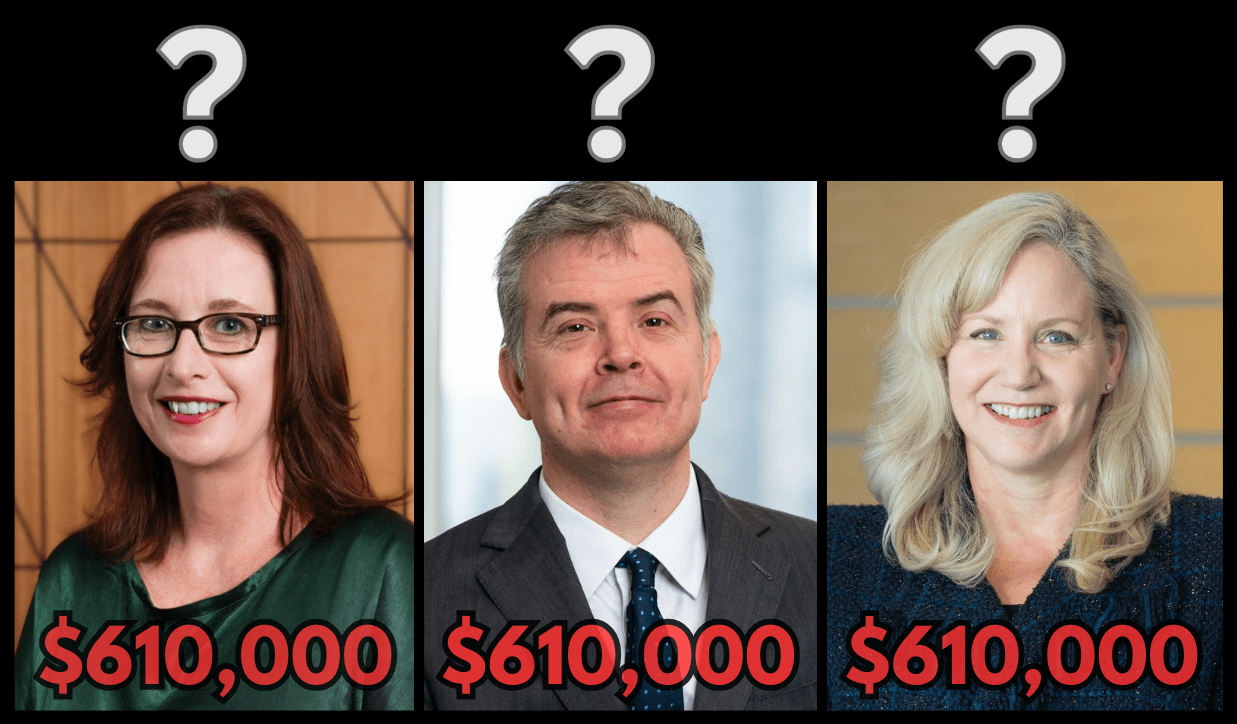ANTHONY KLAN
The National Anti-Corruption Commission has scrubbed from official freedom of information documents the name of its deputy leader who made the “decision” to not investigate any of the six public officials referred by the Robodebt Royal Commission.
In a remarkable move, embattled NACC boss Paul Brereton is not only refusing to say who he appointed to make that “decision”, but the NACC has actively deleted that Deputy Commissioner’s name from documents sought under freedom of information laws.
The ongoing active concealment by the NACC — which Prime Minister Anthony Albanese says is “transparent” — is particularly remarkable given the Deputy Commissioner is a “statutory officer”, meaning their position is so high-level it is set out in federal legislation.
The NACC’s three Deputy Commissioners — Kylie Kilgour, Ben Gauntlett and Nicole Rose — are each paid $612,980 a year by taxpayers.
In its shock June 5 announcement that it would not investigate any of the Robodebt referrals, the NACC noted a potential “conflict” concerning Brereton but only that he had “delegated the decision in this matter” to “a Deputy Commissioner”.

The NACC’s June 6 statement that it will not investigate the Robodebt referrals. The only mention of conflicts highlighted above. Source: NACC
Under Robodebt, run by the former Coalition Federal Government, $1.7 billion in debts were unlawfully raised against more than 500,000 social security recipients, with some taking their lives.
Despite it being biggest public service scandal in decades; the fact the $30 million Royal Commission extended its reporting deadline specifically to make the referrals to the NACC — and that Brereton has a “conflict of interest” — the NACC has repeatedly refused to say which Deputy Commissioner made the “decision”.
The NACC has repeatedly refused to provide that information when contacted by media.
It has also taken the extremely unusual move of hiding the Deputy Commissioner’s name from official documents, citing “personal privacy”.
The documents were obtained under freedom of information laws by highly regarded independent researcher and writer who works as Jommy Tee.
The NACC’s “freedom of information” arm has erased the Deputy Commissioner’s name and replaced it with the words “Section 47F — Persona”.
Appreciate our quality journalism? Please support us for as little as $10 a month

The NACC has scrubbed out the name of the Deputy Commissioner, shown above. The letter is dated July 7, 2023. Source: FoI/NACC
According to the Federal Office of the Australian Information Commissioner (OAIC), Section 47F is a “conditional exemption” which is “intended to protect the personal privacy of individuals”.
The highly irregular action is despite Kilgour, Gauntlett and Rose all being Federal Government “statutory office holders”, paid over $600,000 a year by taxpayers for a high-profile and public-facing roles.
The Section 47F exemption is a “conditional exemption” and only relates to “unreasonable disclosure” and to “personal information”.

Section 47F is a “conditional exemption” and only relates to “unreasonable disclosure” and to “personal information”. Source: AUSTLII
Leaving aside the “unreasonable disclosure” clause — given the Deputy Commissioner is a statutory public official, paid $612,980 a year by taxpayers for presiding over the nation’s peak anti-corruption body — the only “personal information” that would be disclosed is the Deputy Commissioner’s name.
That is, either Kylie Kilgour, Ben Gauntlett or Nicole Rose (shown at top, left to right).
Brereton’s NACC is claiming that the name of either Kilgour, Gauntlett or Rose is “personal information” that should be secret from the public on grounds that doing otherwise would amount to “unreasonable disclosure”.
Kilgour, Gauntlett and Rose have been appointed to five-year terms, taking their total taxpayer payments to over $3m each.
The three, along with Brereton and NACC CEO Philip Reed, are the NACC’s five “statutory officers”.
All were appointed after being selected by Attorney-General Dreyfus.

The leadership structure of the National Anti-Corruption Commission. Source: NACC; Composition: The Klaxon
Between July 1 last year and February, the former head of NACC predecessor the Australian Commission for Law Enforcement Integrity (ACLEI), Jaala Hinchcliffe, was also a NACC Deputy Commissioner.
Hinchcliffe, whose NACC role was temporary, was in February replaced by Kylie Kilgour, who had been deputy commissioner of Victoria’s Independent Broad-based Anti-Corruption Commission (IBAC).
According to the NACC the “final decision” not to investigate any of the six public officials referred by the Robodebt Royal Commission was made on April 6 this year, which is after Hinchcliffe departed.
That “decision”, by the secret Deputy Commissioner, is at the heart of the entire Robodebt scandal, as it goes to whether public officials will be held to account.

Jaala Hinchcliffe. Source: LinkedIn
Freedom of information documents show Brereton declared a “conflict” over the Robodebt referrals.
Brereton is close friend of Kathryn Campbell, the most senior bureaucrat who oversaw Robodebt.
In her final report, Royal Commissioner Catherine Holmes SC found the Robodebt scheme was an “extraordinary saga” of “venality, incompetence and cowardice”.
More from The Klaxon on the NACC & Robodebt:
13 Sep – Not one person “punished” over Robodebt
9 Sep – Brereton’s Robodebt “recusal” claims a sham: Top ex-judge
6 Sep – Questions over NACC Robodebt “investigation”
31 Aug – NACC boss misled Dreyfus over Robodebt
29 Aug – Million dollar NACC boss freezes media as questions heat up
Holmes issued referrals via a “sealed chapter” of the final report, which “recommends the referral of individuals for civil action or criminal prosecution”.
That was so as not to “prejudice” any “future civil action or criminal prosecution” — rather than to protect the “privacy” or “reputations” of those referred.
In July Minister for Government Services Bill Shorten said it was “not sustainable” for the sealed chapter to remain secret indefinitely.
Earlier this month Shorten, a former Opposition leader, said he was departing politics after 17 years as a Federal MP.

The Australian Public Service Commission will not “punish” one person over Robodebt. Source: The Klaxon
Along with the NACC, Holmes made referrals to the Australian Public Service Commission (APSC). Those referrals were for “employer” action, with the APSC being the employer of public servants.
A week ago, over a year after Holmes’ referrals, the APSC delivered its report. Not one public servant will lose their job and just one person was “recommended” for a “reduction in salary”.
More from The Klaxon on the NACC & Robodebt:
26 Aug – “Recused” NACC boss Brereton at Robodebt meeting
23 Aug – NACC’s year-long Robodebt decision: just two pages long
22 Aug – NACC boss breaks own integrity policy over Robodebt
12 July – NACC marred by “silence and secrecy”
8 July – NACCered: How Dreyfus fudged the figures to deliver a secret regulator
1 July — Brereton’s NACC cloaked in military-grade secrecy
The only two people named were Campbell and fellow former Department of Human Services head Renee Leon, both the subject of damning findings.
Yet neither would face any action because both had subsequently left the public service, and so could no longer face any “employer” action.

Paul Brereton (far left), former Governor-General David Hurley (third from left), and Kathryn Campbell (third from right) in 2022. Source: Facebook/Sydney University Regiment
At the time of his appointment, Brereton was publicly known to be close to Campbell, with both serving in senior roles in the Australian Army Reserve.
On the first business day of the NACC’s operations, on July 3 last year, Brereton declared a “conflict”, freedom of information documents show.
Yet as previously reported, Brereton did not subsequently “recuse” himself from the Robodebt referrals matter, instead remaining intimately involved.

The Klaxon’s report on August 26. Source: The Klaxon
Former Supreme Court of Victoria Court of Appeal judge Stephen Charles KC told The Klaxon Brereton’s “delegation” of the final decision (to the secret Deputy Commissioner) of whether to investigate over the Robodebt referrals was “pointless”.
“(It was) pointless because it would have been unthinkable for his inferior to do otherwise than refuse to accept the referrals,” Charles told The Klaxon.
“His inferior would have been well aware…of (Brereton’s) disinclination to cause distress and embarrassment to his close friend Kathryn Campbell”.
“Accordingly, his inferior – whoever that was – would have been well aware of the Commissioner’s view and of his disinclination to deal with Royal Commissioner Holmes’s referrals.”
The NACC’s June 5 announcement it would not investigate sparked predictable widespread public outrage and the following week, after receiving almost 900 complaints, the “NACC Inspector”, Gail Furness SC, announced some action.
Over three months later, Furness is refusing to say whether she has even launched an “investigation”.

Claims by Brereton he “recused” himself over the Robodebt referrals are “simply wrong”, says Stephen Charles KC. Source: The Klaxon
A close inspection of her June 13 announcement shows Furness only stated she would “enquire into” the matter (using that term four times) rather than “investigate” (which is not used at all).
The distinction is important because “investigation” carries a specific meaning under the NACC Act and allows for additional powers, including information gathering.
The NACC Inspector’s complaints handling policy states: “The Inspector aims to complete the assessment of most complaints within six weeks”.
Furness, who was also selected for the role by Dreyfus, has not only refused say whether she has launched an “investigation”, but whether she will launch an investigation.
More to come.
THE KLAXON HAS A SMALL FAVOUR TO ASK: Truly independent, quality journalism is vital to our democracy. Please SUPPORT US HERE. Thank you!
Help us get the truth out from as little as $10/month.
Unleash the excitement of playing your favorite casino games from the comfort of your own home or on the go. With real money online casinos in South Africa, the possibilities are endless. Whether you’re into classic slots, progressive jackpots, or live dealer games, you’ll find it all at your fingertips. Join the millions of players enjoying the thrill of real money gambling and see if today is your lucky day!
The need for fearless, independent media has never been greater. Journalism is on its knees – and the media landscape is riddled with vested interests. Please consider subscribing for as little as $10 a month to help us keep holding the powerful to account.







